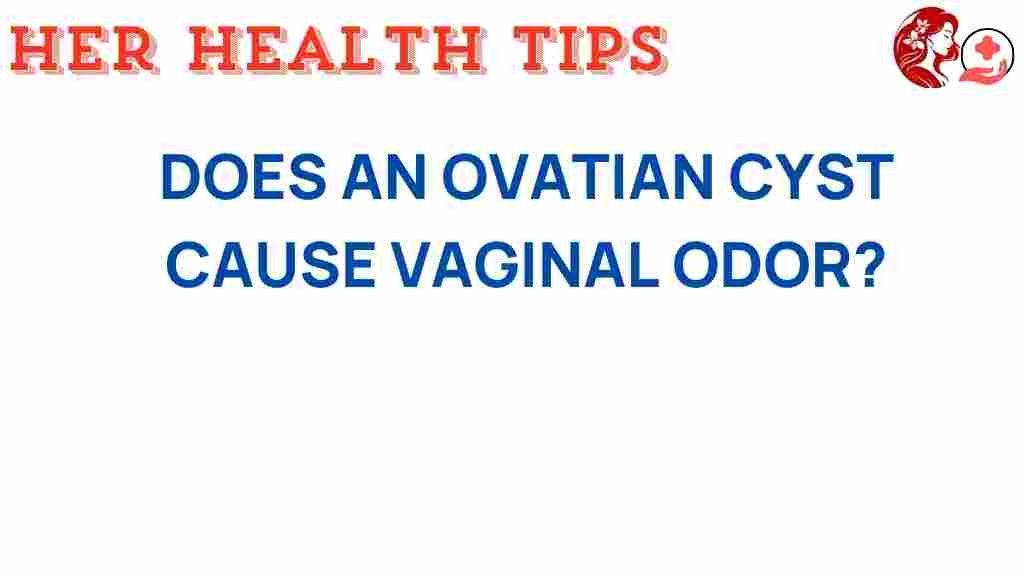Unraveling the Mystery: Do Ovarian Cysts Really Cause Vaginal Odor?
Ovarian cysts are a common concern in women’s health, often leading to questions and misconceptions. One such question that frequently arises is whether ovarian cysts can cause vaginal odor. This article aims to unravel this mystery by exploring the connection between ovarian cysts, vaginal odor, and other related symptoms. We will cover the diagnosis of ovarian cysts, the role of hormonal imbalance, and the potential for pelvic pain. By the end, you’ll have a clearer understanding of these issues and be better equipped to address your health concerns.
Understanding Ovarian Cysts
Ovarian cysts are fluid-filled sacs that form on the ovaries. They are quite common, especially during a woman’s reproductive years. Most ovarian cysts are harmless and resolve on their own, but some can cause complications. Here are some key points about ovarian cysts:
- Types: There are several types of ovarian cysts, including functional cysts, dermoid cysts, and endometriomas.
- Symptoms: Many women experience no symptoms, but some may have pelvic pain, irregular menstrual cycles, or pressure symptoms.
- Diagnosis: Doctors typically diagnose ovarian cysts through pelvic exams, ultrasounds, or CT scans.
The Link Between Ovarian Cysts and Vaginal Odor
Vaginal odor can be influenced by various factors, including infections, hormonal changes, and even lifestyle choices. However, the specific link between ovarian cysts and vaginal odor is often misunderstood. Here are some considerations:
- Infection: If an ovarian cyst becomes infected, it can lead to pelvic inflammatory disease (PID), which may cause a foul odor.
- Hormonal Imbalance: Ovarian cysts can influence hormone levels, which may lead to changes in vaginal secretions and odor.
- Pelvic Pain: While pelvic pain is a symptom of ovarian cysts, it is not directly linked to vaginal odor.
Common Myths About Ovarian Cysts and Vaginal Odor
Many women are misinformed about the relationship between ovarian cysts and vaginal odor. Here are some common myths:
- Myth 1: Ovarian cysts always cause vaginal odor.
Truth: Most ovarian cysts do not cause any odor unless they are infected. - Myth 2: All pelvic pain is caused by ovarian cysts.
Truth: Pelvic pain can arise from various conditions, including menstrual cramps and other gynecological issues. - Myth 3: Ovarian cysts are always dangerous.
Truth: Most cysts are benign and resolve without treatment.
Symptoms of Ovarian Cysts
Recognizing the symptoms of ovarian cysts is crucial for women’s health. While many women may not experience symptoms, some common signs include:
- Pelvic pain or discomfort
- Irregular menstrual cycles
- Abdominal bloating or swelling
- Changes in urinary habits
- Pain during intercourse
If you experience any of these symptoms, it is essential to consult with a healthcare provider for proper diagnosis and management.
Diagnosing Ovarian Cysts
Diagnosis of ovarian cysts typically involves the following steps:
- Pelvic Exam: A doctor will perform a pelvic exam to check for any abnormalities.
- Ultrasound: An ultrasound is the most common imaging technique used to visualize cysts on the ovaries.
- Blood Tests: Hormonal levels may be checked to assess any imbalances.
Once diagnosed, your healthcare provider will discuss the best course of action based on the size and type of cyst, as well as your symptoms.
Troubleshooting Vaginal Odor
If you’re experiencing vaginal odor, it’s important to consider various factors beyond ovarian cysts. Here are some troubleshooting tips:
- Maintain Hygiene: Regular bathing and proper vaginal hygiene can help reduce odor.
- Consider Diet: Certain foods, like garlic and onions, can affect your body odor.
- Monitor Menstrual Cycle: Hormonal changes during your menstrual cycle can alter vaginal odor.
- Consult a Doctor: If odor persists, seek medical advice to rule out infections or other health issues.
When to Seek Medical Attention
It’s essential to seek medical attention if you experience:
- Severe pelvic pain
- Fever or chills
- Vaginal bleeding that is unusual for you
- Persistent vaginal odor that does not improve
Early diagnosis and treatment can help prevent complications associated with ovarian cysts and any underlying infections.
Understanding Hormonal Imbalance
Hormonal imbalance plays a significant role in women’s health and can contribute to the development of ovarian cysts. When hormone levels fluctuate, they can affect menstruation and ovulation, leading to the formation of cysts. Here are some key points:
- Hormonal fluctuations are common during puberty, menstruation, pregnancy, and menopause.
- Stress and lifestyle factors can also impact hormone levels, potentially leading to cyst formation.
- Addressing hormonal imbalances may involve lifestyle changes, medications, or hormone therapy.
The Role of Gynecology in Women’s Health
Gynecology is a crucial field dedicated to women’s health, focusing on reproductive and sexual health. Regular gynecological check-ups can help detect ovarian cysts and other conditions early. Here are some tips for maintaining your gynecological health:
- Schedule regular pelvic exams
- Discuss any concerns with your gynecologist
- Stay informed about your reproductive health
For more information on women’s health topics, you can visit the American College of Obstetricians and Gynecologists.
Conclusion
In conclusion, while ovarian cysts are a common aspect of women’s health, they do not directly cause vaginal odor in most cases. Understanding the symptoms, diagnosis, and potential complications surrounding ovarian cysts is vital for women. It is essential to separate fact from fiction regarding medical myths related to ovarian cysts and vaginal odor.
If you are experiencing symptoms such as pelvic pain or unusual vaginal odor, do not hesitate to seek medical advice. Maintaining regular gynecological check-ups and being proactive about your health can significantly enhance your well-being.
Remember, knowledge is power when it comes to your health, and staying informed will help you make the best decisions for your body.
This article is in the category Reproductive and created by HerHealthTips Team
